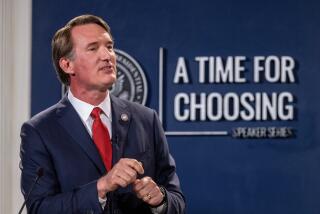Wilder Moves Toward ’92 Bid for Presidency
- Share via
WASHINGTON — Virginia Gov. L. Douglas Wilder, the nation’s first elected black governor, authorized supporters Wednesday to raise money for a possible campaign for the 1992 Democratic presidential nomination.
Wilder was coy about his intentions, saying repeatedly that he plans to complete his term as governor, which runs through 1994. But he said he was definitely interested in gauging support for a 1992 presidential run.
With President Bush enjoying record postwar popularity, the Democratic presidential field is virtually empty. In Wilder’s words: “There is a great deal of lethargy as far as Democratic candidates are concerned.”
In just over a year as governor, Wilder has ruled out raising taxes to erase a $2-billion budget shortfall, instead generating some criticism at home by laying off state workers and cutting spending for education, transportation and other services.
These same actions have brought him praise on the national level, however, as he has advocated a Democratic Party that sheds its liberal tax-and-spend image and seeks to attract voters in what he refers to as a “New Mainstream.” Wilder said he would be taking that message on the road more this summer after his state Legislature recesses.
Still, he insisted: “I am not a candidate . . . . I have not jumped in.” But he acknowledged he did not discourage supporters from making the important first step toward a Wilder presidential run.
The “Wilder for President Exploratory Committee” filed organizational papers with the Federal Election Commission on Wednesday, including a letter from Wilder authorizing the fund. An FEC spokesman said that under agency regulations, the letter is considered a formal declaration of a Wilder candidacy, whether or not Wilder intended it as such.
Wilder, 60, is considered a long shot for the nomination but often is mentioned as a strong possibility for the vice presidential slot on the Democratic ticket. For now, he is the best-known Democrat to take a formal step toward entering the race.
He said a positive report from his exploratory committee would not necessarily trigger a formal candidacy.
More to Read
Get the L.A. Times Politics newsletter
Deeply reported insights into legislation, politics and policy from Sacramento, Washington and beyond. In your inbox twice per week.
You may occasionally receive promotional content from the Los Angeles Times.










